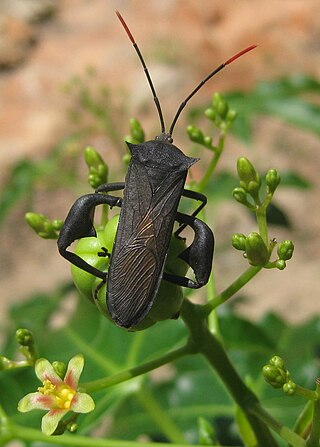
Coreidae is a large family of predominantly sap-sucking insects in the Hemipteran suborder Heteroptera. The name "Coreidae" derives from the genus Coreus, which derives from the Ancient Greek κόρις (kóris) meaning bedbug.
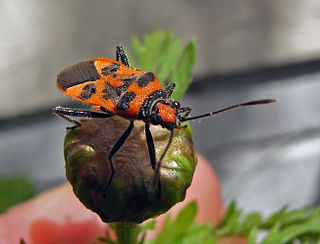
Coreoidea is a superfamily of true bugs in the infraorder Pentatomomorpha which includes leaf-footed bugs and allies. There are more than 3,300 described species in Coreoidea.

Alydidae, commonly known as broad-headed bugs, is a family of true bugs very similar to the closely related Coreidae. There are at least 60 genera and 300 species altogether. Distributed in the temperate and warmer regions of the Earth, most are tropical and subtropical animals; for example Europe has a mere 10 species, and only 2 of these occur outside the Mediterranean region.

Coreinae is a subfamily in the hemipteran family Coreidae. They have been shown to be paraphyletic with respect to Meropachyinae.

Anisoscelini is a tribe of leaf-footed bugs in the family Coreidae. It was formerly spelled Anisoscelidini, but the tribal name spelling was incorrectly formed.

Dalader is the type genus of coreid bugs in the Daladerini tribe. Species in the genus are distributed in tropical Asia, chiefly Southeast Asia. The genus name is derived from the Sanskrit roots dal meaning leaf and dhru which means bearer. This plant bug genus is distinguished by the which preterminal antennal segment being flattened, pear-shaped, and ridged and the terminal segment being paler. Chalcidoid egg parasites have been recorded from this species. Adults of Dalader acuticosta are fried and eaten in northeastern India.
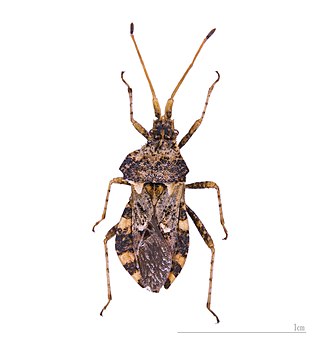
Coreini is a tribe of leaf-footed bugs in the family Coreidae. There are at least 20 genera and 70 described species in Coreini.

Sciocorini is a tribe of stink bugs in the family Pentatomidae.

Eubule spartocerana is a species of leaf-footed bug in the family Coreidae. It is found in South America.

Podopinae, known as turtle bugs, are a subfamily of the insect family Pentatomidae. The type genus is Podops.
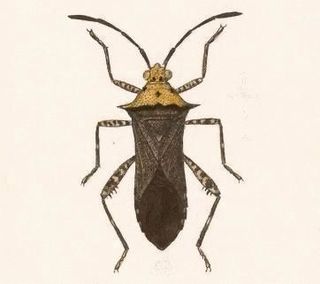
Zicca is a genus of leaf-footed bugs in the family Coreidae. There are about 19 described species in Zicca.

Acanthocephalini is a tribe of leaf-footed bugs in the family Coreidae. There are at least 100 described species in Acanthocephalini found in the Americas.

Namacus is a genus of leaf-footed bugs in the family Coreidae. There are at least four described species in Namacus.
Meropachyinae is a subfamily of leaf-footed bugs in the family Coreidae. There are at least 50 described species in Meropachyinae, recorded from the Americas.

Hypselonotus is a genus of leaf-footed bugs in the family Coreidae. There are about 12 described species in Hypselonotus.

Mozena is a genus of leaf-footed bugs in the family Coreidae. There are more than 30 described species in Mozena.
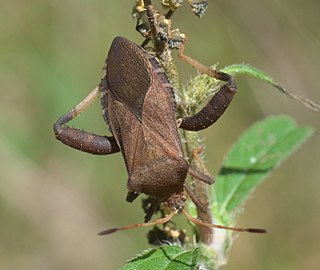
Acanthocerini is a tribe of leaf-footed bugs in the family Coreidae. There are at least 20 genera and 50 described species in Acanthocerini.
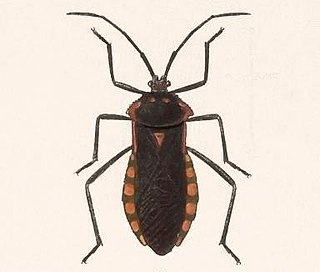
Sephina is a genus of leaf-footed bugs in the family Coreidae. There are more than 20 described species in Sephina.

Nematopodini is a tribe of leaf-footed bugs in the family Coreidae. There are at least 20 genera and 160 described species in Nematopodini.

The Homoeocerini are a tribe of leaf-footed bugs, in the subfamily Coreinae erected by Amyot and Serville in 1843. Genera are distributed from Africa to South-East Asia.



















